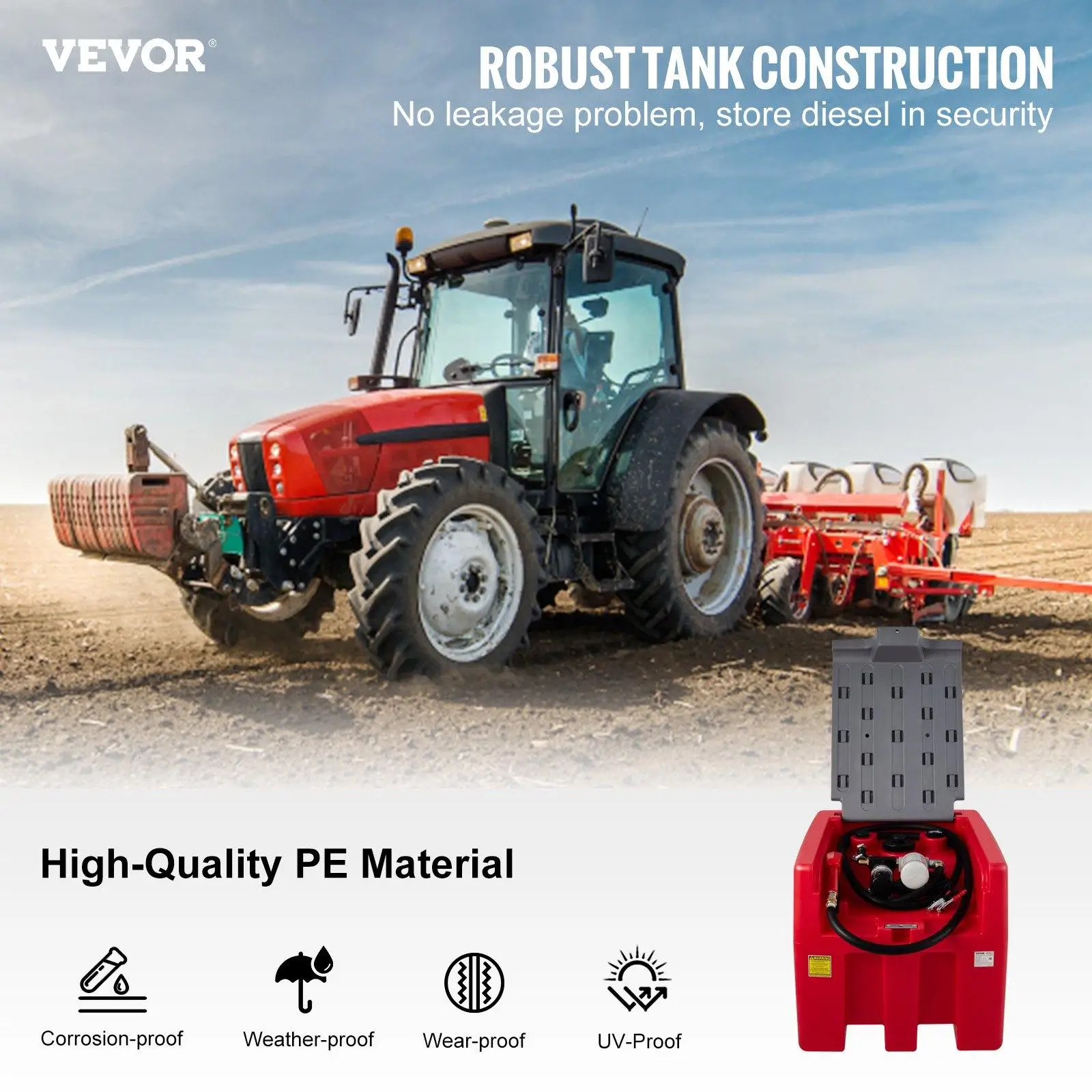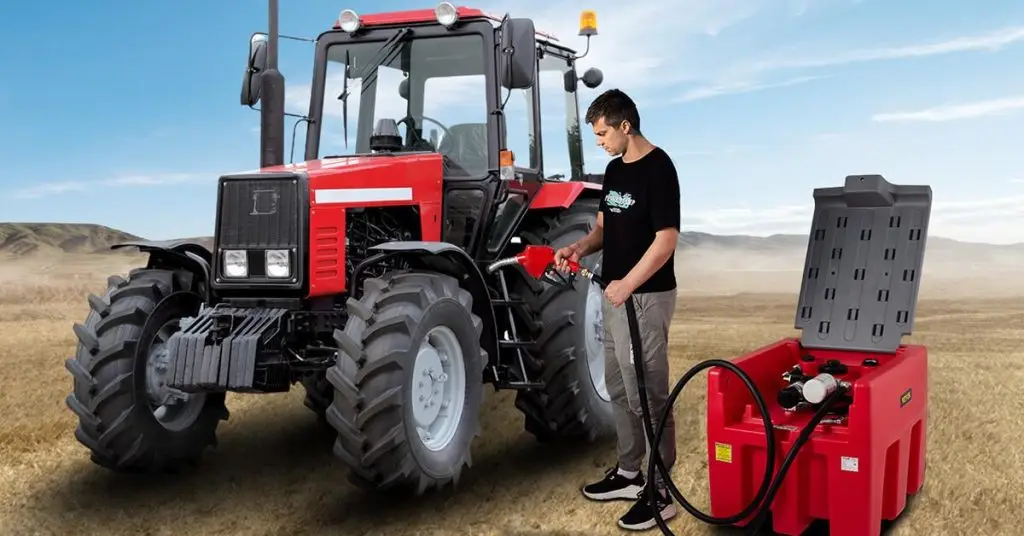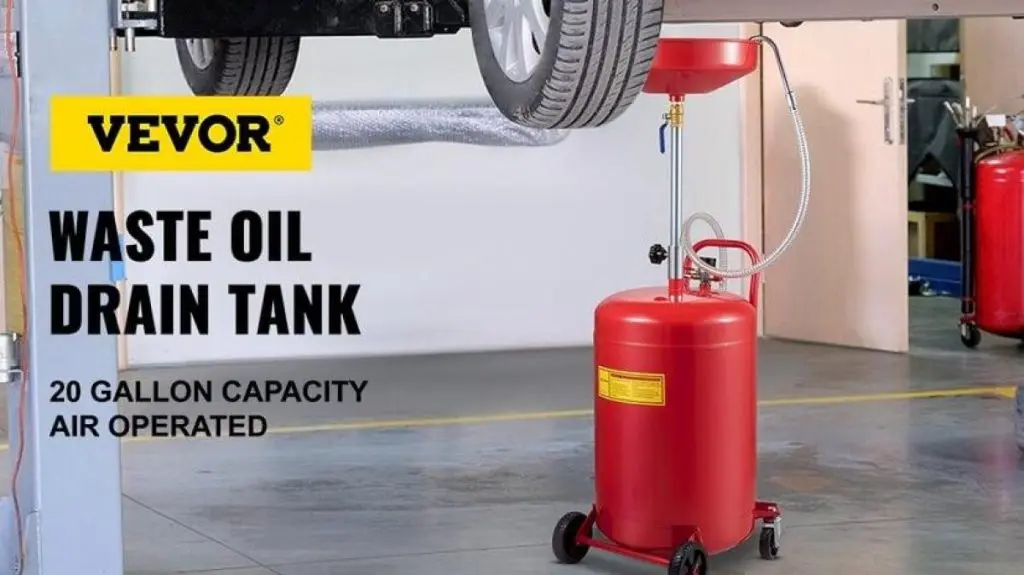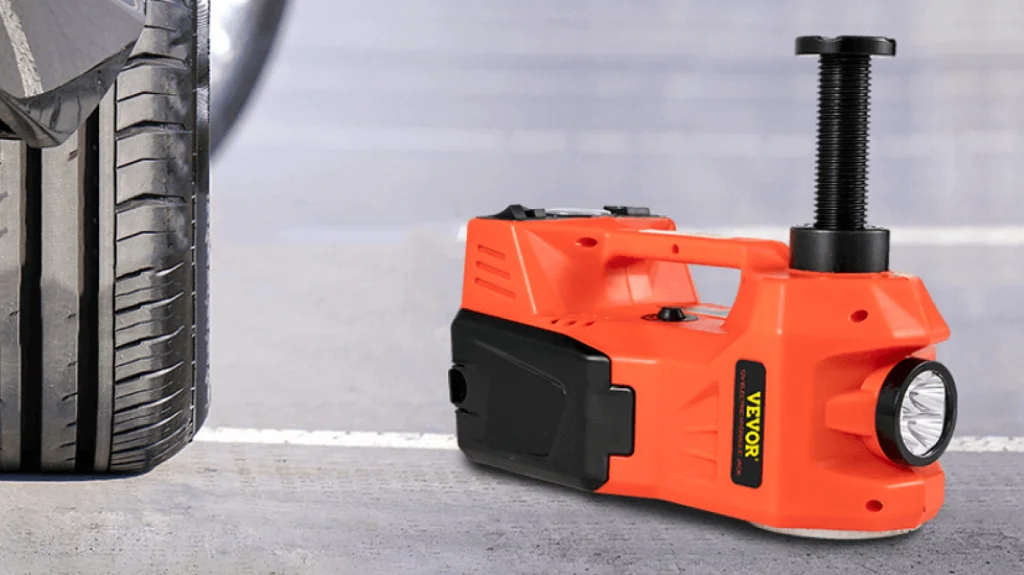A portable diesel fuel tank is a convenient and efficient storage solution designed specifically for the transportation and temporary storage of diesel fuel. Temporary fuel storage tanks are commonly used in various industries, including construction, agriculture, mining, and transportation, where a portable and reliable fuel source is required.
The importance of portable diesel fuel tanks lies in their ability to provide mobility, flexibility, and efficient fuel management. They ensure a reliable fuel supply for various applications, including backup power generation, remote operations, and emergency response, while complying with safety and environmental regulations.
With fuel tanks portable, you can easily transport diesel fuel to remote locations. Also, owning a portable diesel fuel tank offers convenience, cost savings, increased efficiency, and emergency preparedness. These benefits make owning a portable diesel fuel tank a valuable investment for businesses operating in various industries.
What should I look for when buying a portable diesel fuel tank?
When buying a portable diesel fuel tank, the following are key factors to consider.
1. Tank Capacity:
Determine the desired fuel capacity based on your needs and usage frequency. Look for the size of your equipment and the duration of operation between refills. Different fuel tanks offer different storage capacities ranging from 30 – 400 liters. Vevor diesel fuel tanks have a maximum capacity of around 440 liters.
2. Tank Material:
Look for tanks with built-in high-quality substances such as steel or polyethylene. Ensure they are resistant to corrosion, UV rays, and rugged environments. Vevor portable diesel tank material is of high quality that is resistant to harsh environments.

3. Transportability:
Consider the weight, size, and design of the tank. Look for handles, wheels, or lifting points for easy transportation and maneuverability. The Vevor tank has grooves underneath for easy uplifting and transportation.

4. Compatibility with Diesel Fuel:
Verify that the portable diesel fuel tank meets relevant safety standards to ensure it complies with regulations for transporting and storing diesel fuel.
What are the different types of portable diesel fuel tanks?
● Stationary fuel tanks
Stationary fuel tanks are large containers designed to store and hold fuel for an extended period. These tanks are typically used in commercial, industrial, or residential settings where a consistent fuel supply is needed.
Stationary fuel tanks are available in various sizes and capacities, ranging from small tanks that hold a few hundred gallons to large tanks that can store thousands of gallons of fuel. Although, they are frequently built of long-lasting materials like steel or fiberglass to resist the elements and protect the stored fuel.
● Transportable fuel tanks
Transportable diesel fuel tanks are containers specifically designed for the transportation of fuel. Unlike stationary fuel tanks, transportable tanks are intended to be moved from one location to another, making them ideal for applications where fuel needs to be transported to different sites or remote locations.
Transportable diesel fuel tanks come in various sizes and capacities, ranging from small containers that can hold a few gallons of fuel to larger tanks that can accommodate several hundred gallons. These tanks are typically constructed from materials such as steel, aluminum, or polyethylene, which provide durability and resistance to corrosion.
● Auxiliary fuel tanks
Auxiliary fuel tanks are additional fuel storage containers that are added to a vehicle or equipment to increase its fuel capacity. Auxiliary fuel tanks are commonly used in various applications, including long-haul trucking, off-road vehicles, recreational vehicles (RVs), boats, and aircraft. However, they are particularly useful in situations where access to fuel stations may be limited or when extended periods of operation without refueling are required.
● Combination fuel tanks
Combination fuel tanks are fuel storage systems that combine two or more fuel types within a single tank. These tanks are designed to offer flexibility and convenience by allowing the use of different fuels interchangeably.
Combination fuel tanks are commonly used in vehicles, such as trucks or buses, that require the ability to switch between different fuel sources. For example, a combination tank may allow the vehicle to operate on both diesel fuel and compressed natural gas (CNG) or gasoline and ethanol.
Top best portable fuel tanks
The market for small diesel tanks has grown significantly in recent years, with many new options available. The following are the best portable fuel tanks in 2023.
1. VEVOR Portable Diesel Tank
Vevor is a manufacturer of portable diesel tanks that are designed for use in a variety of applications, including on construction sites, in agriculture, and for emergency backup power.
Specifications:
Capacity: Vevor portable diesel tanks come in a variety of capacities, ranging from 30 to 106 gallons.
Material: The tanks are made of high-quality steel, which is durable and resistant to corrosion and other types of damage.
Pump: The tanks come with a built-in pump that can deliver diesel fuel at a flow rate of up to 45 liters per minute.
Nozzle: The tanks come with a nozzle that is designed to prevent overfilling and spills.
Features:
● Portability: The tanks are designed to be portable, with wheels and a handle that make them easy to move from one location to another.
● Safety: The tanks are designed with safety in mind, with features such as a lockable cap and a grounding wire to prevent static discharge.
● Compatibility: The tanks are compatible with a variety of diesel-powered equipment and vehicles.
● Versatility: The tanks can be used for a variety of applications, including on construction sites, in agriculture, and emergency backup power.
Performance:
The Vevor portable diesel tank is made of high-quality steel and is designed to be corrosion-resistant, which can help prolong the life of the tank. It also comes with a built-in pump and a nozzle for easy dispensing of diesel fuel. According to the manufacturer’s specifications, the tank has a capacity of 30 gallons and is capable of holding diesel fuel with a flashpoint of 100 degrees Fahrenheit or higher.
Pros:
● The portability of the tanks makes them easy to transport and use in many locations.
● The high-quality steel construction of the tanks makes them long-lasting and resistant to damage.
● The built-in pump makes it easy to dispense diesel fuel quickly and efficiently.
Cons:
● The pump can be noisy.
2. Titan Truck Master 200 is a diesel fuel Tank
The Titan Truck Master 200 is a diesel fuel tank designed for use in pickup trucks and other vehicles.
Specifications:
Capacity: 200 gallons.
Construction: Heavy-duty 12-gauge steel.
Dimensions: 48″ x 60″ x 24″.
Fill Type: Lockable diesel cap with vent.
Pump: 12-volt GPI pump with automatic shutoff nozzle
Hose: 12-foot hose with static wire.
Features:
● Heavy-duty steel construction helps protect the tank from damage
● A lockable diesel cap with a vent helps prevent fuel theft and spills.
● 12-volt GPI pump with an automatic shutoff nozzle allows for easy fuel dispensing.
● 12-foot hose with static wire provides flexibility in fuelling options.
● Baffled design helps to reduce fuel sloshing during transport.
● Powder-coated finish helps to prevent corrosion.
Performance:
Titan Truck Master 200 appears to be a reliable and high-performing diesel fuel tank. One of the main benefits of the Tank Master 200 is its large 200-gallon capacity, which reduces the need for frequent refueling.
Pros:
● A large 200-gallon capacity reduces the need for frequent refueling.
● Heavy-duty construction provides durability and protection.
● A lockable diesel cap with a vent helps prevent fuel theft and spills.
● Built-in 12-volt pump with automatic shutoff nozzle allows for easy fuel dispensing.
● Baffled design helps to reduce fuel sloshing during transport.
Cons:
● The large size of the tank may make it difficult to fit in smaller trucks or vehicles.
3. The Cemo 210-liter diesel tank
The Cemo 210-liter diesel tank is a portable tank designed for the storage and transport of diesel fuel.
Features:
● Made of high-quality polyethylene material that is corrosion-resistant and lightweight.
● Features a built-in pump with an automatic shut-off nozzle for easy fuel dispensing.
● Comes with a 4m electrical cable and battery clamps for an easy power supply.
● Features a lockable lid to prevent fuel theft and spills.
● Comes with a filling level indicator to help monitor fuel levels.
● Features a built-in vent to prevent pressure build-up inside the tank.
Specifications:
Capacity: 210 liters.
Construction: Polyethylene material.
Dimensions: 800mm x 600mm x 600mm.
Pump: 12V DC electric pump.
Hose: 4m hose with an automatic shut-off nozzle.
Weight: 28kg
Performance:
Cemo portable diesel tanks are designed to be durable, lightweight, and easy to transport, making them ideal for use in a variety of applications, such as in agriculture, construction, and transportation. However, they are typically made from high-quality polyethylene or steel, which provides excellent resistance to corrosion, impact, and UV radiation.
Pros:
● The portable design allows for easy transportation of diesel fuel.
● Made of high-quality polyethylene material that is corrosion-resistant and lightweight.
● Built-in pump with an automatic shut-off nozzle allows for easy fuel dispensing.
● Comes with a filling level indicator to help monitor fuel levels.
● The lockable lid helps prevent fuel theft and spills.
● Built-in vent prevents pressure build-up inside the tank.
Cons:
● As it is made of plastic, it cannot be as durable as steel tanks in certain situations.
Proper usage of portable diesel fuel tanks
To ensure the proper usage of portable diesel fuel tanks, follow these guidelines:
● Read the Manual: Familiarize yourself with the manufacturer’s instructions and guidelines provided in the user manual. It contains essential information about the tank’s specifications, limitations, and safety precautions.
● Select a Suitable Location: Place the portable diesel fuel tank on a stable, level surface away from ignition sources, heat, and direct sunlight. Ensure proper ventilation in the area to prevent the build-up of fuel vapors.
● Grounding: Use a grounding cable or rod to ground the portable diesel fuel tank and prevent static electricity build-up. This reduces the risk of sparks or electrical discharge when fuel is being transferred.
● Fuel Compatibility: Use a diesel fuel portable tank that is compatible with the tank and approved for the specific application. Avoid using contaminated or stale fuel to prevent damage to the tank and fuel system.
● Proper Filling: Fill the tank slowly and avoid overfilling. Follow the recommended fuel level and capacity guidelines provided by the manufacturer. Overfilling can cause fuel spillage and potential safety hazards.
● Secure Connections: Ensure all connections, including hoses, valves, and caps, are properly secured to prevent fuel leakage during transportation or operation. Regularly inspect and tighten connections as needed.
● Dispensing Fuel: Use appropriate fuel dispensing equipment such as pumps, nozzles, and hoses designed for diesel fuel. Take caution to prevent spills and minimize the release of fuel vapors.
● Transportation and storage: When you are not using it, keep the portable diesel fuel tank in a safe and secure location. If transporting the tank, ensure it is secured properly in the vehicle to prevent shifting or tipping during transit.
● Maintenance and Inspections: Regularly check out the diesel holding tank for any gestures of damage, leaks, or degeneration. Clean the tank as recommended by the manufacturer and replace any worn-out parts or components.
Safety precautions and equipment
Safety precautions and equipment are essential in various settings to protect individuals from potential hazards and minimize the risk of accidents or injuries.
Hazard Assessments: Conducting hazard assessments involves identifying potential risks and hazards present in a particular environment. Although, this helps in determining appropriate safety measures and equipment required to mitigate those risks effectively.
Safety Signage: Visible safety signs and labels play a vital role in conveying important safety information, such as warning signs, emergency exit signs, caution signs, and instructions for handling hazardous materials.
Equipment Maintenance and Inspections: Regular maintenance and inspections of equipment and machinery are crucial to ensure their proper functioning and identify any potential hazards or defects.
Proper Ventilation: In environments where there may be exposure to gasses, fumes, or airborne particles, ensuring adequate ventilation systems is essential to maintain air quality and prevent respiratory issues.
Emergency Preparedness: Establishing emergency protocols and conducting drills can help prepare individuals to respond effectively to emergencies. This may involve having evacuation plans, first aid kits, fire extinguishers, and designated emergency assembly points.
FAQs about Portable Diesel Fuel Tanks
1. Do diesel tanks need to be labeled?
Yes, labeling a portable diesel storage tank is important for safety and compliance purposes. Proper labeling helps identify the contents of the tank, alert individuals to potential hazards, and provide necessary information for emergency response personnel.
2. What are the 3 types of fuel tanks?
The three main types of fuel tanks commonly used are Portable Fuel Tanks, Underground Fuel Tanks, and Above-Ground Fuel Tanks.
3. What are the OSHA requirements for portable fuel tanks?
The Occupational Safety and Health Administration (OSHA) in the United States provides regulations and requirements for portable fuel tanks under its General Industry standards (29 CFR 1910) and Construction standards (29 CFR 1926). In these requirements,
Fuel tanks must be equipped with suitable venting systems, portable fuel tanks to be properly labeled with information, and Regular inspection and maintenance of portable fuel tanks are included.
4. What is a standard fuel tank?
A standard fuel tank typically refers to a common or typical type of fuel tank used in various industries and applications. It refers to a tank that meets standard specifications, sizes, and features commonly found in the industry.
5. Why are the fuel tanks labeled?
Fuel tanks are typically labeled to provide important information and warnings regarding their contents, potential hazards, and proper handling.
Top Portable Diesel Fuel Tanks: Concluding Remarks
In conclusion, a portable diesel fuel tank with pump is a great addition to your home. Portable diesel fuel tanks offer flexibility and convenience for temporary fuel storage and transportation needs. However, it is crucial to prioritize safety measures when using these tanks. Adhere to the manufacturer’s instructions, store tanks in well-ventilated areas, and prohibit smoking near them. Take care during fuel transfer, avoid overfilling, and prom





